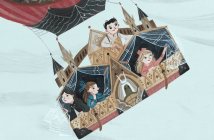Did you love And I Darken and are craving a similar read? Well, we might have the book for you: by C.V. Wyk! This young adult historical fantasy features a gender-bent Spartacus and is perfect for fans And I Darken – and we have the cover AND an excerpt!
Roma Victrix. The Republic of Rome is on a relentless march to build an empire—an empire built on the backs of the conquered, brought back to Rome as slaves.
Attia was once destined to rule as the queen and swordmaiden of Thrace, the greatest warrior kingdom the world had seen since Sparta. Now she is a slave, given to Xanthus, the Champion of Rome, as a sign of his master’s favor. Enslaved as a child, Xanthus is the preeminent gladiator of his generation.
Against all odds, Attia and Xanthus form a tentative bond. A bond that will spark a rebellion. A rebellion that threatens to bring the Roman Republic to its end—and gives rise to the legend of Spartacus…
“As soon as I saw the cover of , I knew that the artist had managed to capture the very heart of what this story is about–how heroes are made, forged. How they rise. I love everything about the design, from the sparks and flames curling ominously around the borders to the font of the title crafted to look like burning steel. And then we see our heroine, Attia, rising from fire and shadow, defiant and unbroken. It’s a fierce, striking illustration of a slave’s war against tyranny,” said Wyk.
releases from Tor Teen on January 16, 2018. Want to take a sneak peek? We have an exclusive excerpt of – just keep reading!
I am Attia of Thrace, a Maedi warrior. I am my father’s daughter.
Yet for the second time in her life, Attia found herself bound like an animal, waiting in a strange room to be given to a worthless pig of a man—the so-called Champion of Rome.
The room was surprisingly simple, almost bare. Nothing like what she would have expected for the so-called Champion of Rome. A hard bed was wedged against one corner and draped with a brown blanket. Across from the bed, two short candles burned on a wooden table. Attia saw what looked like a necklace made of feathers and hemp. The moon shone in through a small window in the outer wall.
She may not have struggled when the guards came, but even before they put the rope on her again, she was ready—ready to spit in the faces of Rome’s elite, to scratch and claw and fight. To kill. As for the champion, well. Soon enough, Attia would meet him face-to-face, and she would see for herself whether this god of the arena bled like a man.
The candles on the table had burned to nearly half their length by the time someone pushed the door open. The guards remained outside as Timeus entered, followed moments later by another man, and Attia finally looked into the face of Timeus’s monster.
The Champion of Rome towered over her. He was younger than she’d expected, with clear skin tanned by the sun and hard lines of muscle and sinew—tokens of his years spent in the arena. His dark hair was cut short in the Roman fashion and accentuated the strong lines of his face. His eyes were bright and green like new grass. He held himself like a warrior, and his mouth formed a grim line as he frowned at her.
That dark look of his had probably made countless men tremble. Attia nearly expected the walls themselves to move to escape his displeasure. But she held her ground. She had never been cowed by a man. She was not about to start now. Attia lifted her chin and glared back, hating both the gladiator and Timeus with every hot drop of blood in her veins.
Timeus grinned at his champion. “No one else has touched her,” he said. “She will be yours to do with as you will—your own little slave, all the way from Thrace.”
Attia wanted to spit in the old man’s smug, bruised face.
The gladiator didn’t seem at all happy with his master’s gift. He barely looked at Attia, and when he did, his expression shifted from shock to dismay to curiosity and then to something that almost looked like shame. He quickly looked away again.
“Unless, of course, you don’t want her,” Timeus continued. “I can’t say I’d be surprised. You’re too picky, honestly. I can never guess your tastes. But my men will enjoy her well enough, and—”
Only then did the gladiator speak. “No,” he said. “Your gift is well received, Dominus. You honor me, and I thank you.”
“As I thought.” Timeus clapped his back. “The gods and the Republic smile on my house because of your victories, my boy. Now I smile on you. Try and enjoy it.”
But the gladiator’s expression remained clouded. Despite his words of acceptance, it was obvious to Attia that the man neither celebrated Timeus’s offering nor seemed remotely grateful. No, he was . . . resigned. Then Timeus and the guards left, and Attia was alone with the gladiator.
They stood facing each other, both scowling deeply enough to darken the room as a heavy rain began to pelt against the outer walls. Attia clenched her jaw with such force that she felt a dull throbbing start in the base of her skull.
The gladiator looked away first. “I didn’t ask for this,” he said, speaking almost to himself. When he looked at Attia again, his eyes lowered to the rope binding her hands. “Let me untie you.” He reached for a small knife on the shelf behind him.
As the gladiator approached her, Attia had to remind herself again—she had to force the words into being. I am the warqueen of Thrace. I am my father’s daughter.
With every beat of her heart, she reached for the anger that simmered just below her skin, for the hate that threatened to consume her from the inside out. She forced herself to remember the screams of the women and children, the valiant war cries of her brave Maedi. The jolt of the cart that bore her to Rome. The rough hands of the merchant who sold her as a slave. The brand and the chains and the face of the legatus who murdered her father.
I am Attia. I am a Maedi. And I have killed before. This will be easy.
Just as the gladiator sliced through the rope, Attia neatly twisted the knife out of his hands, whipped around, and kicked him hard in the hip. She followed the strike with quick blows from her elbows aimed at his head and neck. Using the wall behind her for leverage, Attia leapt forward and drove her knee into his side. The gladiator gasped softly and bent at the waist, cradling a newly cracked rib.
Attia adjusted her grip on the knife and pressed the blade against his throat. “You will never touch me,” she said. “No man will. And you’re not even a man. You’re nothing but Timeus’s monster.”
The gladiator took a deep breath before slowly straightening. “You’re right. So what are you waiting for? Kill me.”
“I plan to.” Just a quick flick of her wrist. That was all she needed.
“Sometime this century?”
Attia pressed the blade harder against his skin. “Aren’t you afraid?”
“Afraid? I would be honored to die at the hands of a Thracian. A daughter of the Maedi. That’s what you are, aren’t you?”
When she didn’t answer, the gladiator slowly fell to his knees before her. Attia froze, her brow creasing in disbelief. Whatever she’d expected from the champion, this was certainly not it. Her small blade pressed against his skin, and a thin trickle of blood ran free.
“I didn’t ask for this,” the gladiator said again. “I didn’t ask for any of it. You can believe me or you can kill me. Whatever Timeus says, I won’t touch you.”
Attia started to shake her head. Why should she believe him? He was a champion of Timeus’s house, of Rome. By everyone’s account, he owned her. Why should she trust anything that came out of the man’s mouth? That was when she saw it—the deep sorrow etched into the gladiator’s face, the fatigue that weighed on his strong body. He hadn’t tried to fight off her attack, and even now, he kept his arms limp at his sides, resigned to the fact that she was about to slit his throat. Why?
They said nothing to each other as the rain continued to beat against the walls. The gladiator spoke of her home, but Thrace suddenly seemed so far away. Another world. Another lifetime. She clenched her teeth to hold down the sob welling in her throat, because the truth was, the gladiator was wrong. She wasn’t one of the Maedi anymore. She had already betrayed every legacy, every piece of the heritage that her father had passed on to her. She’d let him die on that hillside. She’d allowed her people to be massacred. She was no warrior. Not anymore. How could she ever again call herself anything more than a slave? For the first time, she thanked the gods that her father was no longer alive to witness her shame.
Attia slowly lowered the blade from the gladiator’s neck. She almost couldn’t feel the hilt of the knife in her palm.
“If you’re not going to kill me tonight, will you tell me your name?”
“My name is Attia.” She could hear the defeat in her own voice and was sure the gladiator could, too.
He was silent for a long minute though his gaze held hers. “They call me Xanthus.” He gestured half-heartedly toward the bed. “Timeus will want to know he’s gotten his way. Let him think it. You can have the bed. I won’t touch you.” Then he took the rough blanket and spread it out on the floor at the farthest end of the room. Attia watched as he lay down, his back to her and his face to the wall. Within a few minutes, it seemed he was fast asleep.
Attia stood where she was for a while longer, never taking her eyes from the gladiator’s back. Only when her legs threatened to give out from sheer exhaustion did she gingerly crawl onto the gladiator’s bed, pressing her own back against the wall and bringing her knees to her chest. She kept the little knife clutched tightly in her hand. She didn’t make a single sound, though every piece of her felt raw and frayed.
The heavy rain continued outside, and Attia wished the sky would release an ocean onto the house. In the silent depths of her heart, she grieved for her people, for her father, for herself. For the promise of honor and glory and freedom. For the warrior that she was and the queen that she should have been.
Her thoughts turned to the gladiator sleeping just a few feet away, and she wondered if he grieved for something, too. He obviously didn’t fear death. No, in some manic, desperate way, he almost seemed to welcome it. Maybe that was why he hadn’t tried to stop her attack. Maybe that was why she couldn’t bring herself to kill him. Because maybe in this house, in this prison, they both wanted the same impossible thing: to be just a man and just a woman, standing free in the rain.






1 Comment
Pingback: Read excerpts from new YA books! (May 16) - YA Interrobang